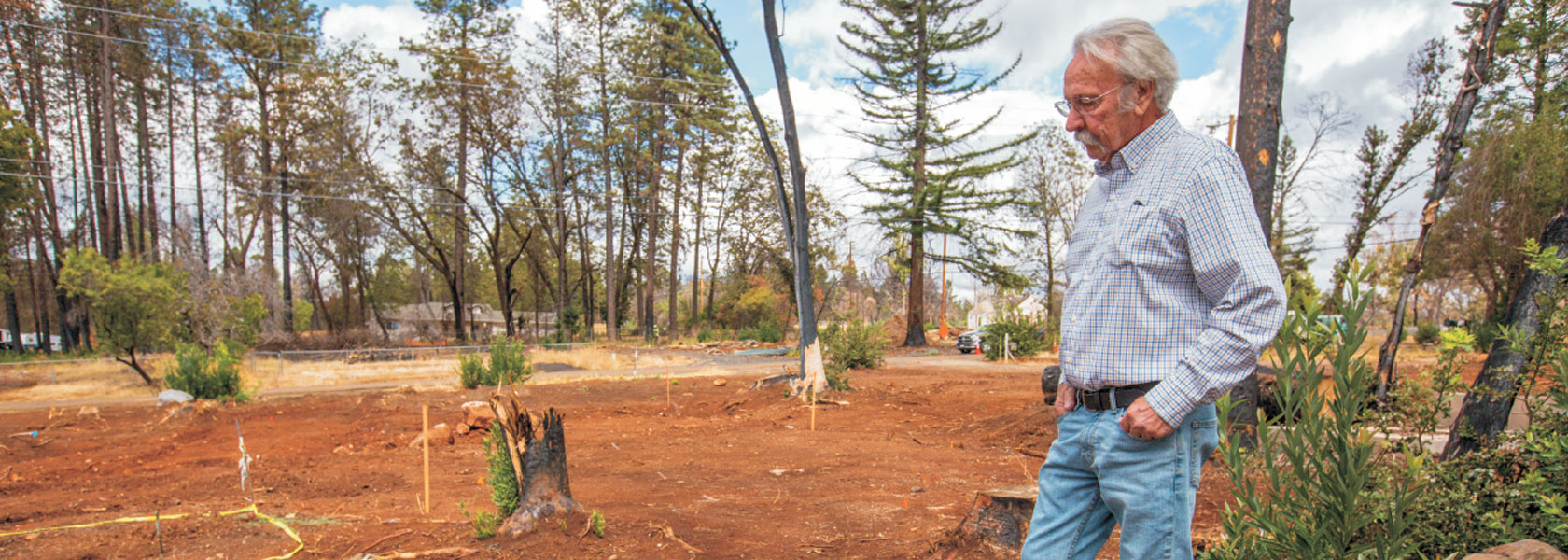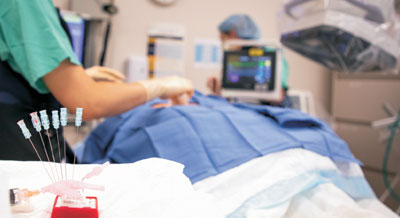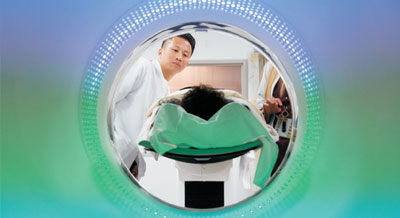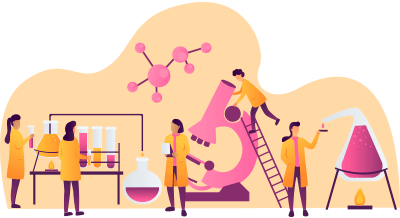“I was able to grab my two kitty cats and my truck,” he said, “but everything else was lost. When you’re panicked, and leaving your house, your mind goes blank.”
Along with his home and his vintage hotrod business, Bromley, 72, also lost a recent refill of medication worth $11,000. The drug is a lifeline for Bromley and prescribed as part of a clinical trial he’s on for his cancer.
Rapid response for patients needing cancer care
Fortunately for Bromley and dozens of other cancer patients who survived the disaster, a diverse and dedicated cadre of nurses, clinical research staff, doctors and administrators sprang into action after the fire. They were determined to make sure no one would be left without critical cancer care, including access to clinical trials.
And they did it despite their own hardships that resulted from the state’s worst wildfire in California history. While many were displaced from their jobs after offices and programs abruptly closed, others lost their homes in the fire, too.
“After the devastating impact of the Camp Fire for patients and staff at Feather River Hospital, the exceptional effort by everyone, including clinical trials personnel of the UC Davis Cancer Care Network, exceeded expectations,” said Richard Bold, physician-in-chief at UC Davis Comprehensive Cancer Center and network medical director. “This experience can provide the necessary framework for other centers and patients to navigate the complexity of ongoing clinical trials’ participation in the setting of disruption of the usual resources.”
On the team were people from Adventist Health and Rideout Cancer Center in Marysville, the UC Davis Cancer Care Network and Comprehensive Cancer Center, and Adventist oncologist Sam Mazj, who had 180 patients in Paradise, several of whom were on clinical trials through an affiliation with Stanford University Medical Center.
Patients remain on cancer clinical trials throughout fire ordeal
Bromley was one of those patients. Diagnosed in 2016 with chronic lymphocytic leukemia, he came to Mazj with lymph nodes in his armpits so swollen that he could barely rest his arms at his sides. His neck was swollen, too, almost to the point at which he couldn’t breathe.
Mazj first tried an aggressive standard treatment to reduce the lymph node swelling. But after three weeks Bromley’s condition only worsened.
The oncologist put Bromley on a clinical trial of a precision medicine drug called Imbruvica that blocks the activity of a protein involved in the communication of B cells, which are abnormal in patients with lymphocytic leukemia. Within a week, the swelling under Bromley’s arms and neck was nearly gone.
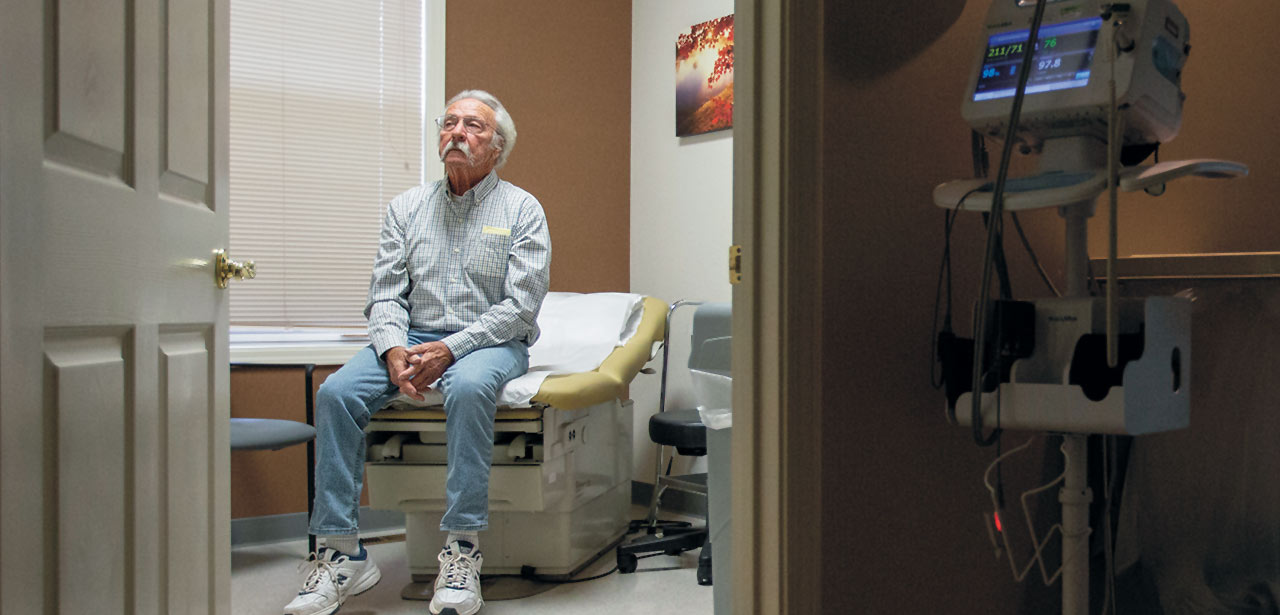
When the fire broke out and Bromley fled without his medicine, he was caught by a safety net stitched together with people and resources from around the region.
After the fire, Mazj quickly set up a tiny office in Chico with two exam rooms and an X-ray machine. He could see patients but couldn’t offer chemotherapy or other treatments. Enloe Medical Center in Chico took about 20 displaced patients. Adventist Health and Rideout Cancer Center in Marysville absorbed most of the rest of displaced patients who remained in the region. Several of the nurses and case managers at Feather River followed their patients to Marysville to provide care, as did Clinical Research Coordinator Mary Jo Lopez, who also lost her house in the fire.
“It’s really important they continue their care to get treatment so that their cancer doesn’t come back,” said Lopez. “If they are on follow-up (post-treatment), they need to keep getting their follow-up exams so if something shows up it can be addressed quickly.”
But the 50-mile drive from Paradise to Marysville proved burdensome for most patients.
“There were times that we had problems getting medications and confusion as to where patients were going to go,” said Mazj. “UC Davis coordinated that well to get things going quickly.”
In April 2019, the UC Davis Cancer Care Network teamed up with Mazj and Adventist Health to open a new cancer care clinic in Chico with six chairs for chemotherapy infusion. It’s where Bromley now goes for his regular check-ups.
New trials management, new clinic, new start for cancer patients
On a cool September morning, Bromley made the trek from Red Bluff, where he’s rebuilding his life, to the new cancer clinic. During the physical exam, Mazj told his patient that the new lab results were good, and the cancer remains in remission. Bromley is still on the clinical trial, and the drug he takes has since been approved by the Federal Drug Administration for treatment of his disease.
“Imbruvica got FDA approval, thanks to patients like Butch,” Mazj said.
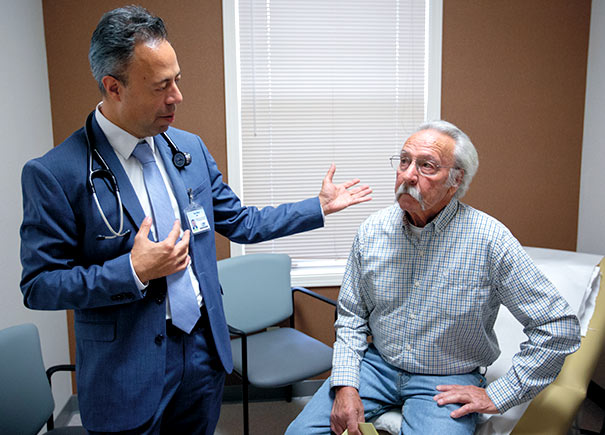
Keeping Bromley and others like him on their trials in the wake of the fire also required clearing several giant hurdles. Government regulations demand rigorous institutional oversight of trials and complex agreements with national cancer clinical trials groups. When the program lost its home, another one had to be established and new agreements drawn up. Feather River’s agreement with Stanford terminated after the fire, forcing Adventist Health to forge a clinical trial oversight agreement with UC Davis Health through the Cancer Care Network.
The trials at Feather River were transferred to Adventist Health and Rideout Cancer Center, a Cancer Care Network site, and several UC Davis oncologists stepped up to lead them. The National Clinical Trials Network made some exceptions to existing rules to allow the patients to continue to be seen close to home. And Mazj was given a faculty appointment at UC Davis to facilitate the transition of care for his patients, including Bromley.
“Had we not acted expeditiously and reached out to all these agencies, the patients may have been lost to clinical trial participation,” said Ofilio Vigil, senior regulatory affairs coordinator for the Network.
“This has truly been a triumph-from-tragedy experience,” added Dana Little, Network clinical research supervisor.
The team’s herculean efforts are becoming a model of post-disaster cancer care for rural communities, particularly the work to preserve clinical trials. They’ve drawn praise and gratitude from both national clinical trials groups and patients, including Bromley.
Thanks to their work, Bromley missed just a couple of days of his trial drug and was able to replace it at no cost. And while he still faces daily struggles as he pieces his life back together, he’s grateful that his cancer care is not one of them.


